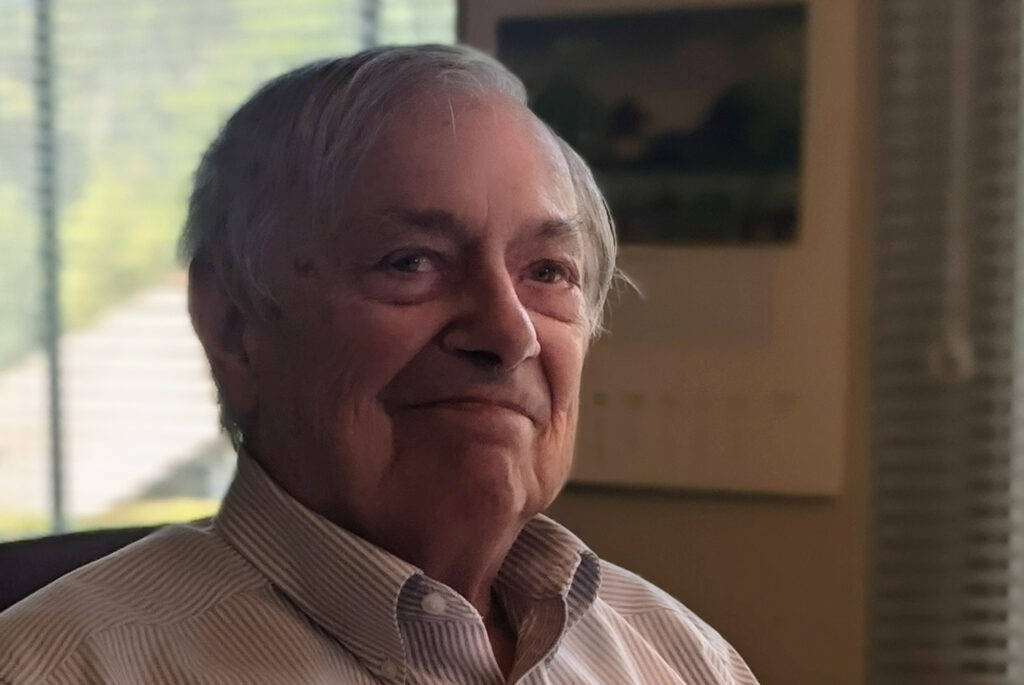In memoriam: Paul D. Sheats, 92, whose love for the outdoors intertwined with Wordsworth scholarship

Courtesy of the Sheats family
“The Making of Wordsworth’s Poetry, 1785–1798,” published in 1973, was recognized as Paul D. Sheats’ signature work.
| October 24, 2024
It was fitting that Paul D. Sheats would be drawn to writing about William Wordsworth. Sheats, a UCLA faculty member for more than half a century, was a lifelong outdoorsman who hiked in Nepal, climbed the Matterhorn and enjoyed sailing late into his life.
Wordsworth, the British Romanticist whose poetry often explored humans’ connection with the natural world, was one of Sheats’ enduring scholarly interests. “The Making of Wordsworth’s Poetry, 1785–1798,” published by Harvard University Press in 1973, was recognized as Sheats’ signature work.
Sheats died Aug. 23 in Los Angeles at the age of 92.
“Paul Sheats will always be remembered for his superb scholarship on William Wordsworth, especially the poet’s early work,” said Saree Makdisi, chair of the UCLA English department. “And he is universally regarded as one of the kindest, warmest and most thoughtful people in the history of the English department at UCLA. We will all miss him.”
In a 1973 review of “The Making of Wordsworth’s Poetry,” Harvard professor David Perkins called the book “remarkably illuminating and important” and placed it among the handful of most significant Wordsworth analyses of the preceding decade.
Michael Sheats, Paul’s younger half-brother, remembered hearing about Paul’s visit to Cockermouth, England, the village where Wordsworth was born — giving him the opportunity to pore over handwritten pages with Wordsworth’s first-draft poems.
“I’m sure his connection to nature was what led him to Wordsworth,” Michael Sheats said. “And I’m sure that trip was one of the happiest times in his life.”
Sheats was born June 17, 1932, in Albany, New York, to Paul Henry Sheets and Dorothea Burns. Paul H. Sheats would later serve as a UCLA professor and was the final dean of University Extension to oversee the program when it was statewide. The younger Sheats moved several times during his childhood — living in Ohio, Connecticut, Maryland and Florida.
After earning bachelor’s degrees in biology, in 1954 from Harvard College — where he also ran track — and in English, in 1957 from Oxford University, Sheats taught English at Haverford College, from 1958 to 1960. He returned to Harvard for his master’s (1963) and doctorate (1966), both in English.
Sheats joined UCLA as an assistant professor of English in 1966, eventually reaching the rank of full professor in 1978, when he also began a five-year term as English department chair. He wrote introductions for new editions of poetry collections by both Wordsworth (1982) and John Keats (1975), both published by Houghton-Mifflin.
Living in California, Sheats took advantage of the state’s natural beauty, from the mountains to the coast. In addition to indulging his interest in hiking, he maintained a boat in Marina del Rey for a time; Michael Sheats said his brother enjoyed sailing out to San Miguel Island, the westernmost of the Channel Islands.
Sheats and his first wife, Audrey Hathaway, had two children, Elka Bear and Paul W. Sheats, known as Will. He later wed Barbara Packer, who joined the UCLA English faculty in 1978. The two were married until Packer’s passing in 2010; Michael Sheats said Packer was the love of his brother’s life.
Sheats gave generously to UCLA, including in his wife’s memory, by supporting the Barbara L. Packer Lectures, which continue annually. He also supported the Paul D. Sheats Summer Fellowships for graduate students in the English department starting in 2015, among other philanthropic gifts. In retirement, he remained connected to his UCLA community, meeting over lunch — and later over Zoom — with fellow emeriti faculty.
And he continued to share his considerable expertise on poetry.
“I showed him a death haiku that I had been working on,” Michael Sheats said. “In what was probably his last piece of literary criticism, he told me, ‘I wouldn’t change a word.’ That meant a lot to me. And I’m not going to.”
